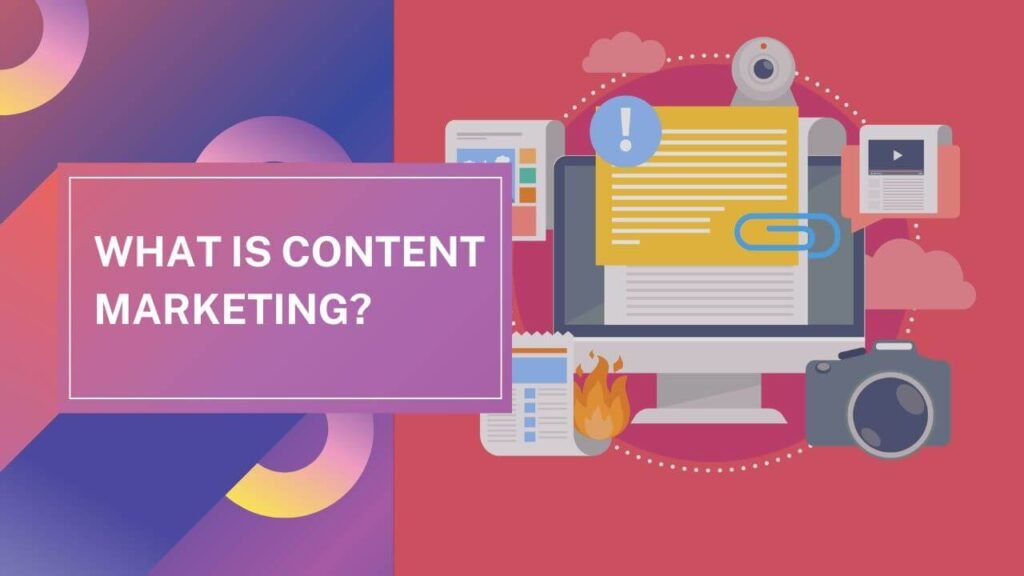
Today, businesses and organizations focus on creating and distributing relevant, educational, and valuable content to build strong relationships with their customers and earn their trust. By doing this, they not only attract more customers but also convert them into loyal ones.
Content marketing is the process of creating and sharing valuable content. It helps you become a thought leader in your industry, build your brand’s credibility, and boost brand awareness. For these reasons, content marketing is essential for almost every business and organization.
What is content marketing?
Content marketing is a strategic marketing approach that focuses on producing, publishing, and distributing high-quality and relevant content that educates or entertains a well-defined audience. The aim is to build relationships and foster trust with potential customers, ultimately encouraging the target audience to make profitable actions.
Content marketing is basically providing the solutions to the audience’s pain points via informational and relevant content, rather than directly promoting products or services.
What type of content does your target audience like the most? With that in mind, you can create various types of content, including blog posts, videos, images, social media posts, podcasts, infographics, emails, and white papers.
According to the Content Marketing Institute’s survey, 83% of marketers say content marketing is the most effective marketing strategy for demand generation. Around 45% of marketing and media leaders said they planned to increase investments in content marketing in the next 12 months, reported by Statista.
6 Elements of the Content Marketing Process
The content marketing process consists of 6 elements that work together to attract, engage, and retain a target audience.
1. Content Planning
Businesses and organizations need to develop a strategic plan for their content marketing efforts. The plan must have a clear objective to be achieved, a clearly defined audience to be reached, and a content calendar that should be followed to ensure the right content is delivered to the right audience at the right time.
2. Content Creation
Once your plan or strategy is ready, next you should begin creating content. Creating content is a bit challenging and time-consuming; writing creative content requires a huge brainstorming session that takes a long time.
One important thing I want to mention is the selection of your content type; there are various types of content, including articles, videos, images, and email newsletters. You should research the types of content that resonate most with your target audience.
3. Content Optimization
Before you publish your content, it’s highly crucial that you optimize it for search engines. This will ensure that your content is easily discoverable whenever your target audience searches for relevant keywords.
Optimizing your content may vary slightly across different search engines and platforms; the core optimization techniques remain the same. You can easily optimize your content by adding a relevant title, keywords, meta description, and more.
4. Content Distribution
Once you have optimized your content, the next step is to publish it on the right channels. Choosing the right channels is crucial to ensure that your content reaches the right audience.
It’s highly recommended to publish your content on the channels where your target audience actively spends their time. It will lead to high engagement, strong relationships, and improved conversion rates.
5. Content Repurposing
Want to reach a larger audience? That’s where content repurposing comes into play. You can easily repurpose your content by changing its medium, like from text to video, breaking up long-form content into small pieces, or republishing your current content on other platforms.
6. Content Maintenance
The last step of the content marketing process is content maintenance. It’s important to regularly audit, update, and optimize your content to keep it relevant, valuable, and performing at its best.
Once you follow all these steps, your content will deliver outstanding results, establish thought leadership in your industry, build strong relationships, foster customer loyalty, and increase your conversion rate.
Why is content marketing important?
Content marketing is extremely important, as it offers numerous benefits for businesses and organizations.
1. Build Authority
By offering valuable and relevant content, you build your brand’s credibility and authority.
2. Increase Online Visibility
Publishing high-quality content results in more shares, more traffic to your website, a wider reach, and enhanced online visibility.
3. Generate More Leads
Content marketing brings more visitors to your website, helping you attract more leads that will eventually turn into loyal customers.
4. Boost Loyalty
Content marketing also boosts customer loyalty, motivating your customers to make repeat purchases and keep coming back.
Conclusion
Content marketing involves understanding the information needs of your target audience and delivering high-quality, valuable, and relevant content that addresses those needs. This approach helps to build trust and establish your authority in the industry.
Content marketing is more effective than directly promoting your products and services. It brings plenty of benefits, like building trust, getting more visibility online, keeping customers loyal, and attracting more leads.

